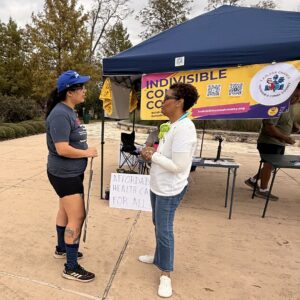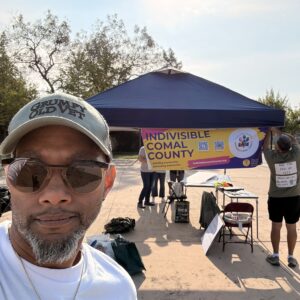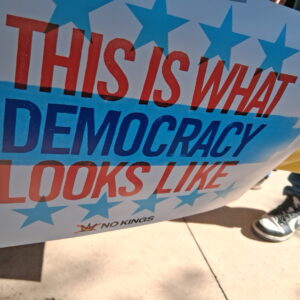Pete Marocco tried to upend USAID in 2020 — and failed. In 2025, he dismantled it
March 25, 2025
Our Semi-Authoritarian State
March 25, 2025As the Trump administration escalates its attacks on democracy, Americans are fighting back—from the streets to the checkout aisle to the halls of Congress. Whether by joining nationwide protests, boycotting corporations that fund anti-democratic policies, or pressing elected officials for action, there are concrete steps you can take right now. Here’s how to make your voice heard.
This post will be updated as new marches and demonstrations are announced.
1. Join an in-person march or demonstration, wherever you live.
Here are several upcoming events to join.
Wednesday, April 2: Rally for Patient Rights at the U.S. Supreme Court
Planned Parenthood is running free buses from the cities below:
- Chapel Hill, N.C.
- Charlotte, N.C.
- Greensboro, N.C.
- Raleigh, N.C.
- Charleston, S.C.
- Columbia, S.C.
- Charlottesville, Va.
- Richmond, Va.
(Or reach out to bring your own bus.)
Saturday, April 5: Hands Off! National Day of Action
Protests will take place nationwide; find an event near you here.

“They’re dismantling our country. They’re looting our government. And they think we’ll just watch,” warns the event’s website. “Donald Trump and Elon Musk think this country belongs to them. They’re taking everything they can get their hands on, and daring the world to stop them. On Saturday, April 5th, we’re taking to the streets nationwide to fight back with a clear message: Hands off! … If we don’t fight now, there won’t be anything left to save.”
2. Make your concerns known to your elected officials.
First, figure out who represents you in Congress: Visit congress.gov to find your U.S. senators and representatives.
Once you’ve identified your officials, track upcoming events where you can engage with them: Follow them on social media, sign up for their newsletters, or simply call their office to ask when their next public meeting will be held. If no events are scheduled, ask your representative’s office to host one. (Organizations like Indivisible are tracking public town halls.)
Then prepare what you are going to say. Most organizations recommend writing out a script so you’re ready. Always start by introducing yourself: who you are, where you live. Which issues do you care most about? Can you share personal details to make the issue more salient to your elected official and anyone else reading or listening—how will this affect you, your family, your community? Data or talking points will make your opinion stronger.
Here are some sample scripts for phone calls and letters, courtesy of the ACLU:
Sample Call Script
Hello, my name is … I live in [town/city] and am part of this community. I’m reaching out to speak to you to [support or oppose] [issue]. [Provide a short description of the issue]. I’m asking you to [support or oppose] [issue] because . [Issue] matters to me because… Again, please vote to [support or oppose] [issue].
[Optional] If needed, I can best be reached at [preferred contact information].
Thank you for your time.
Sample Email or Letter Script
Dear [Elected Official Title and Name},
My name is , I live in [town/city] and am part of this community. I’m reaching out to ask you to [support or oppose] [issue]. [Provide a 1-2 sentence description of the issue]. I’m asking you to [support or oppose] [issue] because . [Issue] matters to me because . Please [support or oppose] [issue] when it comes to a vote.
Thank you for your time.
Sincerely,
[Name} [Address] [Email or phone if you would like to be contacted]
Here are some best practices for asking questions of elected officials in person, according to this toolkit from Moms First:
Arrive early. Sit near the front where you’re more likely to be called on. If you’re in a group, try to spread out a bit. This way, you’ll all have a better chance of getting called on—it also opens the door for you to follow up on each other’s questions.
Blend in. Elected officials are less likely to call on someone wearing a protest or advocacy-themed shirt. Your priority is getting your question answered and capturing their response—so dress neutrally to maximize your chances of being heard.
Be respectful but direct. Ask clear, fact-based questions.
Bring others. Numbers matter. …
Record a video, if allowed. Get organized ahead of time! Decide who in your group will capture the moment on video and post on social media. Remember: Pics or it didn’t happen. …
Take notes. Write down the candidate’s responses so you have an accurate record you can refer back to later. Voice recording apps are great for this!
Look for the media. Journalists often seek out individuals who have asked candidates questions at community events. If you’re comfortable, share your experience with the press! Just remember to stay on topic and share how the issue personally affects you. This is all about the issues, regardless of party lines.
3. Partake in economic boycotts.
In January, Target ended its diversity, equity and inclusion (DEI) program under political pressure and in anticipation of Trump administration policies. Now, during Lent, Black faith leaders are urging a 40-day boycott in protest, with over 100,000 shoppers—many from Black churches—joining the pledge. Led by Rev. Jamal Bryant, the boycott began on Ash Wednesday (March 5) and runs until April 17, the Thursday before Easter. Target stock has already dropped 57 percent.
Another resource, Spending Spotlight, helps consumers redirect their dollars away from companies funding attacks on reproductive freedom, LGBTQ+ rights and democracy itself. Under the banner, “The fight for reproductive freedom/LGBTQ+ equality isn’t just happening in the legislatures—it’s happening in the checkout aisle,” Spending Spotlight includes a user-friendly visual guide for how consumers can “put our spending power to work for reproductive freedom/LGBTQ+ equality.” For example, the Spotlight now recommends consumers switch away from Uber—which contributed $1 million to Trump’s inaugural fund, with the CEO kicking in another million—to Lyft, which, in addition to not having made any direct contributions to the administration has also “kept its promise to withhold donations from election deniers.”

Great Job Roxanne Szal & the Team @ Ms. Magazine Source link for sharing this story.


























